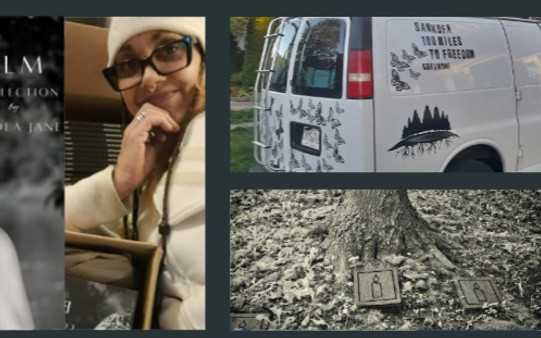Portfolio


This evocative collection blends personal narratives, and poetic reflections to explore the historical struggles of the African Diaspora through the lenses of land, identity, and liberation. Rooted in resilience and renewal, "Soul to Soil" examines the connections between social justice, environmental stewardship, and the healing power of nature, inspiring reflection on equity, dignity, and humanity’s bond with the Earth.
Location: Kitchener, ON, Canada
Medium: "Ancestor Literary Prose:
A Journey from Soul to Soil"
"The mapping Our Shared
Human Journey"
The "Mapping Our Shared Human Journey" curriculum engages students in exploring empathy, diversity, and human rights through interactive activities. Students will learn about discrimination, inclusivity, and the importance of celebrating differences through culture-sharing games, group exercises, and affirming peer interactions. This hands-on approach fosters understanding, self-esteem, and respect for diversity.
Workshop Overview: This four-module course introduces students to the rich, complex history of humanity, fostering empathy, understanding, and curiosity about the world. The course focuses on key historical moments, cultural developments, and ideas that have shaped our global society, helping students explore identity, diversity, and innovation through engaging, age-appropriate lessons.
Module 1: Empathy and Understanding with Jane Eliot Using Jane Eliot’s famous “Blue Eyes, Brown Eyes” experiment, students will explore the impact of discrimination and the importance of empathy. Module 2: Our Shared Origins: The African Story Students learn that our species originated in Africa, emphasizing the shared roots of all human beings.
Module 3: Explorations, Empires, and the Origin of Race This module covers the great oceangoing voyages and the rise of global empires, discussing both the achievements and the darker sides, such as the genocide of Indigenous peoples. Students will also explore how the concept of race was constructed, leading to divisions that still impact us today.
Module 4: Music, Food, and Innovation in the New World Focusing on the cultural exchanges that shaped the New World, this module introduces students to the music, food, and innovations brought by African, Indigenous, and European peoples. They’ll learn about Black inventors and cultural contributions that transformed the Americas, connecting history to their everyday lives.
Social Studies Curriculum: The analysis of exploration ethics fosters critical perspectives on historical narratives, in line with Ontario’s focus on global connections and responsible citizenship. Activities and Impact: Debates and reflective essays help students analyze complex social issues, fostering critical thinking and understanding of the impacts of colonization.
Participants learn about the effects of discrimination, inclusivity, and the importance of celebrating differences through culture-sharing games, group exercises, and affirming peer interactions.
This hands-on approach fosters understanding,
self-esteem, and respect
for diversity.




